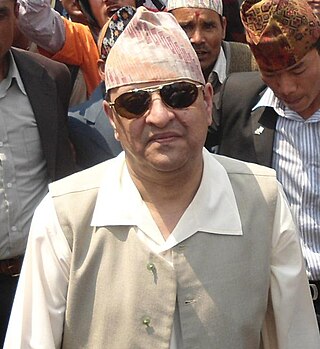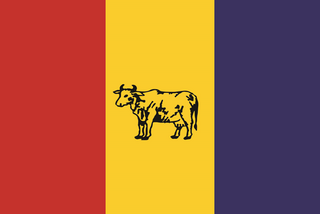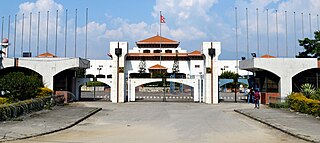
The politics of Nepal functions within the framework of a parliamentary republic with a multi-party system. Executive power is exercised by the Prime Minister and their cabinet, while legislative power is vested in the Parliament.

Gyanendra Bir Bikram Shah Dev is the last king of Nepal, reigning from 2001 to 2008. As a child, he was briefly king from 1950 to 1951, when his grandfather, Tribhuvan, took political exile in India with the rest of his family. His second reign began after the 2001 Nepalese royal massacre. Gyanendra Shah is the first person in the history of Nepal to be king twice and the last king of the Shah dynasty of Nepal.

Pushpa Kamal Dahal, alias Prachanda, is a Nepalese politician, currently serving as the Leader of the Opposition, since July 2024. He has served as the Prime Minister of Nepal on three separate occasions, from 2008 to 2009 as the first prime minister of the Federal Democratic Republic of Nepal, from 2016 to 2017, and again from 2022 to 2024.

The Communist Party of Nepal (Unified Marxist–Leninist) (Nepali: नेपाल कम्युनिष्ट पार्टी (एकीकृत मार्क्सवादी-लेनिनवादी), romanized: nēpāl kamyuniṣṭ pārṭī (ēkīkṛt mārksavādī-lēninavādī); abbr. CPN (UML)) is a communist political party in Nepal. The party emerged as one of the major parties in Nepal after the end of the Panchayat era.

Sher Bahadur Deuba is a Nepali politician and former prime minister of Nepal. He has also been serving as the president of the Nepali Congress since 2016. Deuba has served five terms as prime minister and is the Member of Parliament for the parliamentary constituency of Dadeldhura 1.

The Rastriya Prajatantra Party is a constitutional monarchist and Hindu nationalist political party in Nepal.

The Nepalese democracy movement was the combination of a series of political initiatives and movements from the 20th century to 2008 that advocated the establishment of representative democracy, a multi-party political system and the abolition of monarchy in Nepal. It has seen three major movements, the Revolution of 1951, Jana Andolan and Loktantra Andolan which ultimately abolished the Shah monarchy, transitioned Nepal towards a republic and reintroduced multi-party bicameral democracy.

Prakash Koirala is a Nepali politician, formerly a Member of Parliament and a former Cabinet minister who held the portfolios of Environment, Science and Technology. He was elected to the House of Representatives through a by-poll after the 1999 election on behalf of the Nepali Congress representing Rautahat 4 parliamentary constituency. He is the son of former Nepalese prime minister Bishweshwar Prasad Koirala, and the father of Bollywood actress Manisha Koirala and actor Siddharth Koirala.

Rastriya Janashakti Party was a liberal political party in Nepal, led by former Prime Minister Surya Bahadur Thapa. Thapa had split away from the Rastriya Prajatantra Party in November 2004. The party was registered with the Election Commission of Nepal in March 2005. The party merged into Rastriya Prajatantra Party on July 25, 2007.
Renu Kumari Yadav is a Nepali politician and member of House of Representatives on proportional representation.
The fourth Chand cabinet was formed on 11 October 2002 after Lokendra Bahadur Chand was appointed as prime minister by King Gyanendra, The cabinet only had representatives from two political parties of the dissolved House of Representatives. The cabinet was expanded on 18 November 2002. The cabinet was reshuffled in 11 April 2003.

The first Nepalese Constituent Assembly was a unicameral body of 601 members that served from May 28, 2008, to May 28, 2012. It was formed as a result of the first Constituent Assembly election held on April 10, 2008. The Constituent Assembly (CA) was tasked with writing a new constitution, and acting as the interim legislature for a term of two years.
Prakash Man Singh is a Nepalese politician and a leader of the Nepali Congress and current Deputy Prime Minister of Nepal. He is the son of Nepali politician Ganesh Man Singh. He has also been the Minister of Local Development and Federalism in Sushil Koirala's Cabinet.
Events from the year 2002 in Nepal.
Events from the year 2005 in Nepal.

Gyanendra Bahadur Karki is a Nepali politician from Nepali Congress. He is the former Minister for Information and Communications of Nepal. He was Finance Minister under Deuba cabinet, 2017. He has been elected as a House of Representative from constituency 4 of the Sunsari district in 2017 Nepalese legislative election.

On 7 June 2017, Sher Bahadur Deuba got elected as the new Prime Minister of Nepal and therefore formed the new Governmental Cabinet of Nepal Deuba's candidacy was supported by the Rastriya Prajatantra Party Nepal, the Rastriya Janata Party Nepal, the Nepal Loktantrik Forum, the Federal Socialist Forum, Nepal and several small parties represented in the Nepalese Parliament after a power-sharing deal with the Communist Party of Nepal, who also supported Deuba's candidacy. After being sworn in, Deuba formed a new government in a coalition with the parties that supported his election. On 17 October 2017, in preparation for the Nepalese legislative election, the Communist Party of Nepal decided to cooperate with the Communist Party of Nepal. For this, all of their ministers left the cabinet after Prime Minister Deuba was prepared to dismiss them.
The second Deuba cabinet was formed on 26 July 2001 after Nepali Congress leader Sher Bahadur Deuba was appointed as prime minister by King Gyanendra. The cabinet was expanded on 18 October 2001.
The fifth Surya Bahadur Thapa cabinet was formed on 11 June 2003 after King Gyanendra appointed Surya Bahadur Thapa as prime minister. The ministers were assigned extra portfolios on 1 August 2003.












